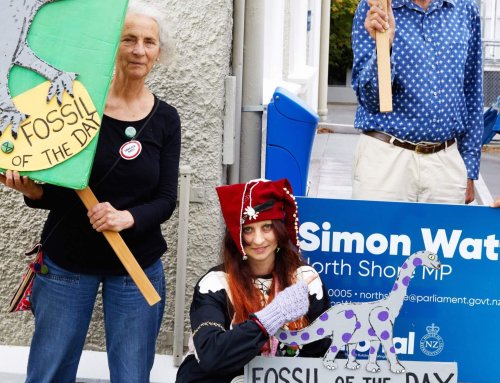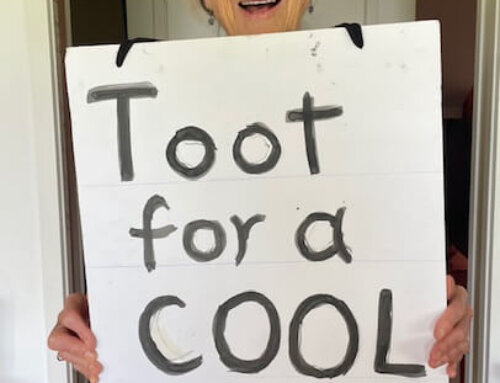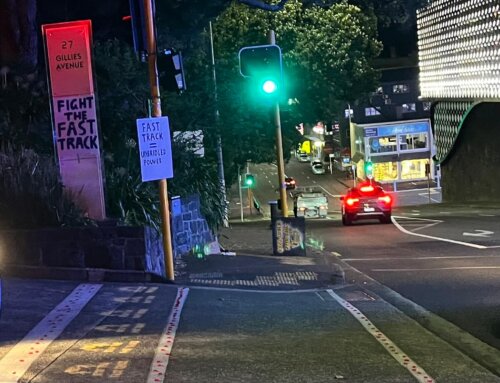Originally posted on The Spinoff.
Tired of the procrastination and timidity of government-led change, climate rage is now ripe for rebellion. Cordelia Lockett explains why.
All mouth and no trousers. That pretty much sums up New Zealand’s response to climate change. A lot of words but little demonstrable action. Remember Alister Barry and Abi King-Jones’ excellent documentary on the history of our political climate response – Hot Air? The clue was in the title.
Our new government is promising large but delivering light. One billion trees will be planted? Nice, but the eco-benefits come with a 20 year lag. It’s also banned new oil and gas exploration permits. Well, great, but what about current permits? Some of them will yield new wells to drill and hydrocarbons to burn for years – if not decades – to come. With frightening international climate research released almost daily, people who are paying attention are deeply alarmed by the yawning gap between talk and walk.
However, that may all be about to change. In the last month, there’s been a sudden surge of new energy in the climate movement. In the United States, several cities (sensibly circumventing any hope of leadership at a federal level) have declared a state of climate emergency. The dynamic new congresswoman Alexandria Ocasio-Cortez is championing a visionary Green New Deal: a mobilisation plan to rapidly reduce carbon while simultaneously addressing associated social problems. Australian kids are skipping school to protest about the climate. And in Britain a new people’s movement has emerged – Extinction Rebellion – which is disrupting the streets and spreading like wildfire.
Another day, another terrifying climate report. Today, the Lancet Countdown on Health and Climate Change reported the dire impacts of global warming on human health. Yesterday, a UN report revealed that due to increased economic growth, emissions rose again in 2017 after a four-year lull. And that’s the ultimate test, isn’t it? If the Paris agreement was sufficient we’d see emissions falling. But it isn’t, because they’re not. The IPCC says we have about 12 years to turn the ship around; the UN secretary-general warns we have just 18 months. But big ships take time to change course, so we must start immediately.
In recent years, New Zealand’s climate movement has chugged along. Not through lack of effort by the many environmental NGOs, community groups and individual climate activist heroes, but public complacency has meant they never seriously rocked the status quo. The 2015 climate march had large numbers, but since then it’s all been fairly quiet. We now have the Green Party involved in government for the first time with co-leader James Shaw as Minister for Climate Change. Our Prime Minister regularly mentions the issue in her speeches, even saying climate change is her generation’s nuclear-free moment. I agree. But where’s the bold programme of policy initiatives to match the strong words and size of the problem? We need leaders who act, not just talk about acting. Let’s do this.
The government needs first to acknowledge the scale and urgency of the problem by declaring a climate emergency and develop a credible plan to decarbonise the economy as quickly and as justly as possible. To do this will require a decent-sized tax on carbon and methane. Cars and cows: a scary agenda for many Kiwis, admittedly. A massive education and social marketing campaign would help communicate the need for widespread change. This should focus on the financial and other costs of inaction, as well as the multiple benefits of a comprehensive, transition to a fossil-free, climate-protecting society.
In early October this year, the IPCC released a special report highlighting the catastrophic consequences of allowing global temperature increase to exceed 1.5 degrees. The tone was stronger and scarier than previous reports, and the wording unequivocal. To have any hope of getting climate change under control we need to halve emissions by about 2030 and then drive them steadily down to zero by 2050. And to do so, it says, would require “rapid, far-reaching and unprecedented changes in all aspects of society”. That sounds to me like systemic change: a social, political and economic transformation, no less.
In late October, a group of nearly 100 UK academics wrote an open letter stating that their government had failed to protect them from climate breakdown and declaring their support for Extinction Rebellion. This prompted me to write a similar letter and circulate it among academics and researchers here, calling on our government to take bold and urgent action to tackle the crisis. The letter pointed to a culture of hyper-consumerism and a singular political focus on economic growth as the drivers of climate change. It rapidly got 150 signatories, including a number of climate scientists, several emeriti professors and fellows of the Royal Society. The response from the Minister was predictably mild and managerial, praising the letter and its signatories, but lacking the kind of big vision and immediate plan of action needed.
Extinction Rebellion (XR) is a mass movement emerging from the long-standing UK social justice network Rising Up. It’s a response to climate inaction and incrementalism by governments, and instead advocates non-violent direct action and civil disobedience. XR’s radical campaign is sweeping through Europe and beyond. Local groups have cropped up all over the UK, and the spark has already caught fire in Canada, Germany, Sweden, the United States, Australia, Denmark, Czech Republic, France, Netherlands, Finland, Ireland, Switzerland, Scotland, Spain, Norway, India, Italy, Solomon Islands. And Aotearoa. Here, there are groups springing up in short order: Auckland, Wellington, Christchurch, Thames, Waihi, Hamilton, Palmerston North, Nelson and Tauranga.
But why now? Was it that latest IPCC report? Or the WWF announcing that we’ve wiped out 60% of the world’s vertebrate animals? Or the wildfires in California killing 88 people – with 200 still missing – and demolishing a whole township? Or the record-smashing Northern Hemisphere summer temperatures? Or just an idea whose time has come? The speed of the XR pile-on shows a thirst for something big, a grand project. And collective direct action is a great vessel in which to pour one’s climate-related anger, fear and despair. It’s collegial and energising. Tired of the procrastination and timidity of government-led change and frightened by what is being called a direct existential threat, climate rage finally has a home. Perhaps this is the mass movement Chris Trotter hankers for.
The UK has a proud tradition of radical environmental activism. The difference between XR and other groups is that large numbers of people are prepared to forgo their liberty (get arrested, even go to prison). It’s also community-organised, has international outreach (the DIY flavoured actions clearly have huge appeal) and its ground-level bold moral leadership is inspiring. The hope is that a movement like XR can mobilise enough people and inspire widespread action to turn the tide on that big old 20th century oil and coal-driven ship. Established climate groups may feel some resentment that this Johnny-come-lately is stealing the limelight when they’ve been plugging away at it for decades. But more likely, they’ll just get on board.
Something is seriously lacking in our current, complacent practice of democracy. Will a new climate politics of localised people movements embolden world governments to take the ambitious policy steps required to produce deep and lasting emissions reductions and limit warming to 1.5 degrees? The first test will be in a few days’ time at the COP24 meeting in Katowice, Poland where countries will write the rulebook on how they will implement the Paris agreement made three years ago but already obsolete. And at home, we’re pinning big hopes on a gutsy Zero Carbon Bill as it winds its way through the sluggish legislative tract.
It’s something of a cliche, but New Zealand really could be world-leading in its climate response. We have a vibrant indigenous culture of kaitiakitanga, practical virtues of courage and hard work, moral values of equality and harmony with the environment, and a legacy of taking radical political initiatives which have global impact. We can do it again with the climate crisis. It’s not only necessary: it may just be possible.





